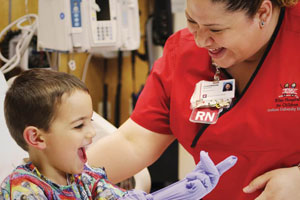
Dealing with incontinence and other urinary problems can be an ongoing challenge for some children. Some children will have little or no improvement, despite being treated by their physician, a pediatric urologist and other specialists.
Even after visiting the Children’s Continence Program at Riley at IU Health, a small number of children may still have issues with incontinence, recurrent infection and inability to empty their bladders. When this happens, they are referred to our Refractory Voiding Dysfunction Program.
The goal of the program is to give children part of their lives back. Children who are referred to this program are usually age 6 and up who have been dealing with incontinence (or other urinary problems) for years. They may have difficulty emptying their bladder, knowing when they need to go to the bathroom or have recurring urinary tract infections. Their quality of life has been impacted because they are worried about having accidents at school, and are concerned about relationships with peers or participating in sports and other activities.
Once your child is referred to the program, we review all bladder history and previous treatments to see if any treatment options or medications should be repeated. We will make sure all possible therapies have been tried and may order some advanced tests such as urodynamics or magnetic resonance imaging (MRI). Finally, we may consider a referral or consultation with other types of doctors, including neurosurgeons or gastroenterologists. If all forms of therapy, medications, behavioral modifications and other treatments have been exhausted, we consider other options.
Treatment Options for Voiding Dysfunction
The Refractory Voiding Dysfunction Program provides new and advanced treatment options, bringing hope to children and families who have been dealing with incontinence for years.
Some children benefit from sacral neuromodulation (Interstim®), a technique previously used only for adults. For this procedure, small electrodes are placed near the sacral nerves that help control the bladder. The electrodes act like a pacemaker for the bladder, helping children know when they need to use the bathroom and assisting them with emptying their bladders. This procedure is performed in the operating room while your child is sedated. It involves a test period of about two weeks to see if the electrodes work. If so, a more permanent device is placed. This procedure has been beneficial in over 75 percent of patients who have failed all other therapies for reducing or curing incontinence.
Another treatment option for improving continence in some patients may be Botox®. This treatment involves injecting Botox® into the bladder muscle through a small scope. This procedure is done in the operating room. Botox® helps relax the bladder and reduce incontinence. The effects usually last six to 12 months, and injections may need to be repeated.
Conditions & Services
Conditions Treated
Our pediatric specialists provide patient- and family-centered care for most related conditions. The links below provide more specific information about some, but not all, of the conditions that we treat.
Services Offered
We offer a number of different Refractory Voiding Dysfunction Program services. Below are some, but not all, of the services that we provide. If you have a question about a specific service that is not listed here, please contact our program.
Related Departments
Related Departments
We provide multispecialty care for a number of conditions. Below are links to our related departments.
Health Professionals
For Health Professionals
Specialists in the Riley at IU Health Urology Department work with primary care physicians to evaluate and care for children affected by refractory voiding dysfunction. Referring physicians may contact us by phone at 317.944.8896.
Refer A Patient

Riley at IU Health works with referring physicians in Indiana and beyond.
Refer A PatientResearch
The Refractory Voiding Dysfunction Program is leading urology research through new questionnaires that look at how incontinence affects patients’ quality of life. These survey tools are used to study how incontinence issues may impact a child’s school, home and overall life experience.

